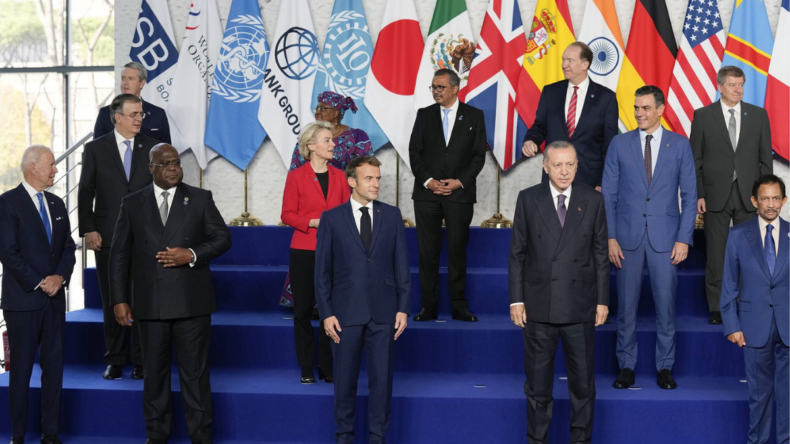After the annexation of Crimea in 2014, the G8 expelled Russia and became the G7. Could the G20 become the G19 after the invasion of Ukraine? Christian Lindner, the German finance minister who chaired talks on Ukraine with his G7 counterparts this week, said there was a consensus that international diplomacy with Russia could not return to business as usual.
When asked about the G20, German finance minister, Christian Lindner, said it was “unimaginable” for Western diplomats to sit alongside Russian diplomats “as if nothing had happened”. But, as Mr. Lindner noted, any G20 decision would require the approval of world leaders in a club that goes far beyond the G7’s western-aligned democracies.
One of those leaders, Australia’s Prime Minister Scott Morrison, said he was open to expulsion of Russian ministers. In a statement, Prime Minister Scott Morrison said the prospect of world leaders sitting around a table with Vladimir Putin after accusations of war crimes is a “step too far”.
“They have chosen to be a pariah state and no one should have anything to do with them,” Mr. Morrison said. An opinion piece by former US ambassador to NATO Ivo Daalder said Russia had “no place in the G20” and other formal talks should be suspended but diplomatic channels kept open.
China refuses to expel Russia from G20

China said on Wednesday that Russia cannot be expelled from the G20, after Washington suggested it. As part of its diplomatic protection for Russia, Beijing described it as a “important member” of the G20.
In addition to the G20, the Chinese Foreign Ministry has a number of other forums for economic cooperation. ‘No member has the right to expel another member,’ In a G20 statement on geopolitical risks, Russia and China removed a reference to “current tensions” before the Ukrainian invasion.
Obstacles to Russian G20 membership
Despite international condemnation for the bloody invasion of Ukraine, Moscow has indicated Mr. Putin will attend the G20 leaders’ summit in Bali in November. But now many of those G20 countries have sanctioned Russia, in the largest ever package imposed on a G20 member, said UK Prime Minister Boris Johnson.
European diplomats left a human rights summit in Geneva this week after Russian Foreign Minister Sergey Lavrov took the microphone. However, the G20 has more potential allies than the G7. That was evident in a similar debate in 2014, when Australia chaired the G20 after Russia annexed Crimea.
Those calling for Russia’s exclusion from the G20 were met with opposition from its BRICS allies: Brazil, India, China, and South Africa. They and Russia said the G20 “belongs to all member states equally” and the host country had no right to act unilaterally.
President Vladimir Putin attended the Brisbane summit but left early after being chastised by world leaders for his country’s actions. The BRICS could be a useful ally for Mr. Putin this year. Mr. Bolsonaro said Brazil would not take sides in the Ukraine crisis, and China and India abstained in the UN Security Council vote.

South Africa called on Russia to withdraw its forces from Ukraine, but hoped for a diplomatic solution. Indonesia’s deputy central bank governor, Dody Budi Waluyo, said on Monday Jakarta’s position was one of neutrality and it would use its G20 leadership to try to resolve problems, but Russia had a ‘strong commitment’ to attend and other members could not forbid it from doing so.
Indonesia, this year’s host, has tried to downplay tensions by focusing on economic issues. It has condemned the attack on Ukraine but did not supported sanction. Since the war began, Indonesia has had to tread carefully.
That country was not named in its first statement. Since then, Jakarta has backed UN resolutions criticizing Russia. After a brief pause, President Joko Widodo has called for a dialogue rather than sanctions. However, Russia had made a ‘strong commitment’ to attend and other members couldn’t stop it.
Published By: Apoorva Wakodikar
Edited By: Subbuthai Padma













